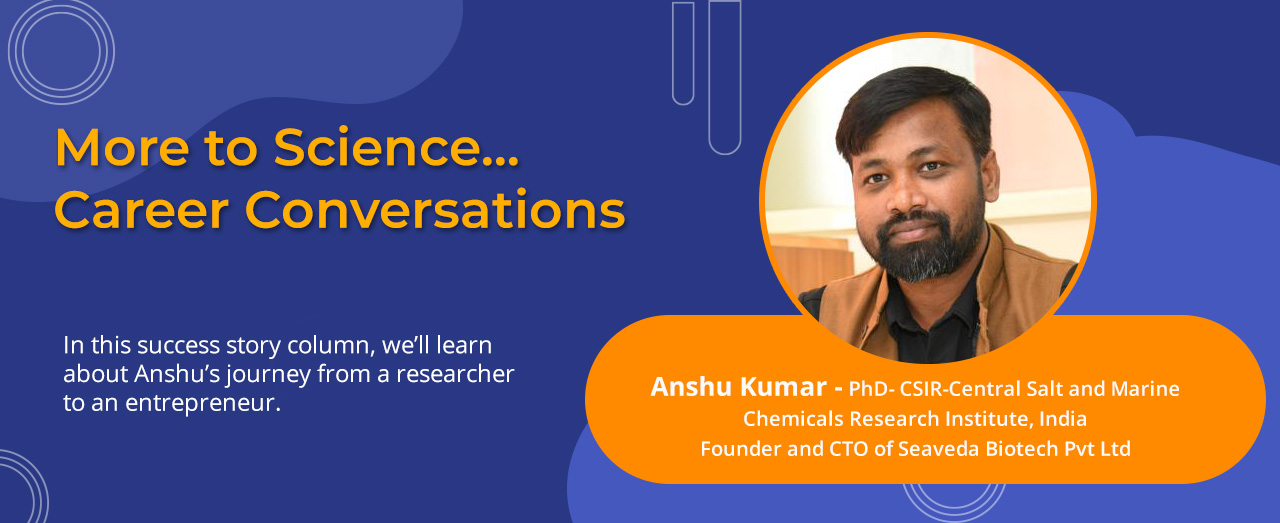
What were your initial years like? What appealed to you to choose such an unconventional offbeat career? Tell us a bit about your career path.
In 2019, I, along with my co-founders, established Seaveda Biotech Pvt. Ltd., Gujarat, India. I am an inorganic chemist and received my Ph.D. in Chemical Sciences from the CSIR-Central Salt and Marine Chemicals Research Institute, India, in 2017. During my PhD days, when I began working on an industrial project in 2012-2013, I got many opportunities to interact with business leaders. My friends and I were inspired by their approach, vision, and financial management.
In 2016, together with my two friends, Dr. Krishna Kanta Ghara and Dr. J. P. Chaudhary, initiated our R&D to develop a protocol for commercially viable seaweed-based personal care and food items. We established Seaveda Biotech Private Limited in 2019 and introduced our first brand, "AquazyTM," to the Indian market. With the assistance of PDEU-Innovation Incubation Centre Gujarat and IIM Ahmedabad, we participated in numerous business exercises to help us build the core business skills of marketing, accounting, operations, and finance. In March 2023, we intend to introduce another brand, ErthCareTM, to the Indian market.
How did you get your first break?
We are aware of our strengths—technological expertise in chemistry—as well as our weaknesses— lack of financial structuring and product marketing skills. With our participation in the IIMA and PDEU-IIC mentorship programme, we started to work on our weaknesses. This mentorship activity helped us to identify who will be our ideal clients. We started taking part in business conferences, seminars, exhibitions, etc., which helped us to communicate with our target audience. I recalled that I had my first break in 2019 during the PDEU-IIC Gujarat start-up pitch desk.
Were there any challenges you had to face while choosing this alternate career path? What do you wish you’d known when you’re starting with this role? What would you do differently if you could go back in time?
We are first-generation entrepreneurs, and the background of our team members is core technological. We had to overcome several obstacles because we lacked business skills, including team building, accounting, marketing, creating a business model, identifying your target market, pricing your items, legal paperwork, product certification, and financial planning.
I think that picking your role has to do with how happy and confident you are. Every time we finished any industrial job, we were ecstatic and self-assured. This enabled us to accept the challenge of launching our brand in the international market.
I would never want to go back in time and do things differently. No matter what. I would never want to undo my failures, as much as they hurt me. I would never want to unwind the clock and try to skip past the painful moments or try to live a perfect life because it’s my failure that has shaped and moulded me the most. Not my success.
“These are my strongest assets.” [say skills, areas of knowledge, personality traits and values]. Where would they fit in this field of work of yours? What does it take to be successful here?
For some people, becoming a great entrepreneur comes naturally. For others, starting and running a successful business requires a specific set of talents, expertise, values, and personality qualities. Both hard and soft skills, which I have learnt during my entrepreneurial experience, are my strongest assets. For running and managing a business, hard skills like technology development, which is market-driven, accounting, marketing, and financial planning, are essential and soft skills like communication, problem-solving, and decision-making support business growth. Entrepreneurial skill mastery takes practice, an optimistic attitude, and a committed learning schedule.
“These are my strongest assets.” [say skills, areas of knowledge, personality traits, and values]. Where would they fit in this field of work of yours? What does it take to be successful here?
I have always loved doing new stuff and learning different things. I have also been a writer in some form or the other all my life. I used to enjoy writing poetry and short stories during my college. It helps if you can coherently articulate your thoughts. The job requires understanding data, but more than that it is critical that you can convey your insights in a comprehensible manner. You act like a bridge who deciphers clinical, scientific data and presents it in a manner that can be used in making decisions downstream.
In this industry, I have seen that individuals who are articulate and can see the data from a bird’s eye view as well as the microscopic details tend to do great. One also needs to be able to adapt to new things, multitask and be good at cultivating interpersonal relationships to be successful here. One needs to work with a lot of different stakeholders in this role, and developing interpersonal relations is a big part of it.
How easy or difficult will it be for fresh PhDs to make a transition to your current field of work?
PhD is not a degree; rather, it is a period of skill development that teaches you how to take on genuine challenges, identify problems, and find scientific solutions to those problems.
Being an entrepreneur is neither an easy nor a difficult journey. It depends on how resilient and confident you are. If fresh PhDs start spending some time developing their entrepreneurial skills, which include a variety of skill sets like leadership, risk-taking abilities, business management, time management, creative thinking, and problem-solving, I firmly believe that their entrepreneurial journey will become 10 times easier